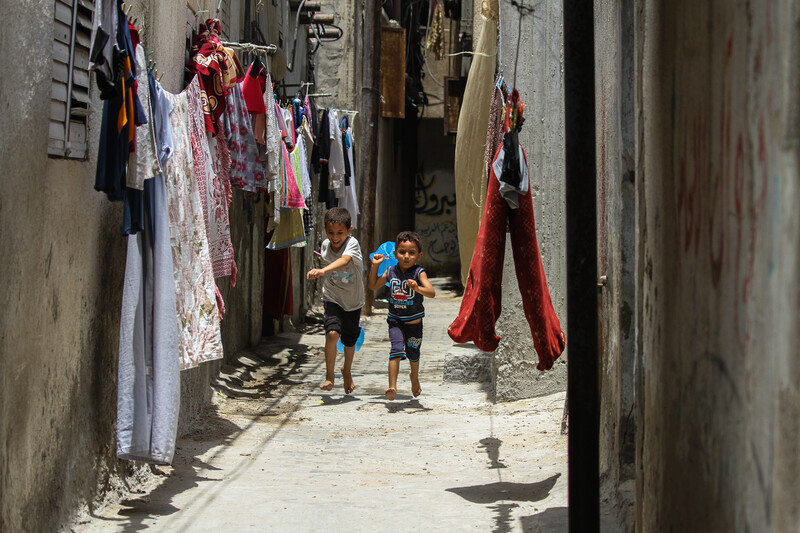The Electronic Intifada 28 July 2020

Children play in the alleys of their refugee camp in the northern Gaza Strip.
IMAGESLIVEOmar Abed lives in uncertainty.
It has been three months since the Palestinian Authority intelligence officer has been paid. With no indication when his wages will next come through, he is an anxious man
A father of six – two of them at university, one an infant – Abed has been unable to pay the rent for the house his family lives in.
“I am unable to provide milk and diapers to my baby. I almost burst out crying when I went to the bank to ask for an advance and they refused,” Abed, 45, told The Electronic Intifada.
The Palestinian Authority has not paid the full wages of its employees in the West Bank and the Gaza Strip since May, citing a severe financial crisis.
In Gaza, PA employees have received just one half of a monthly wage since May.
That crisis is in part brought on by the PA’s refusal to accept tax revenues collected on its behalf by Israel. It is doing so in protest at Israeli plans to annex parts of the occupied West Bank.
On 19 May, Mahmoud Abbas, the PA’s president, announced that the authority was no longer bound by its previously signed agreements with Israel, including security and economic agreements.
According to senior PA sources, after the PA made that announcement, Israel decided to condition payment of the revenues, normally transferred automatically, on coordination with Palestinian officials. Since Abbas had announced an end to all such lines of communication, the PA refused.
Tax revenues are a critical source of income for the PA, constituting more than 60 percent of its total budget.
The main effect has been on public sector salaries. The number of PA security and civil servants in the occupied West Bank and Gaza is estimated to be around 140,000, each providing for an average household of five.
In Gaza, some 38,000 people rely on PA salaries, down from 60,000 in 2017, when the PA began reducing its Gaza wage burden by enforcing early retirement.
The Fatah-dominated PA and Hamas have been at loggerheads since 2007 when Hamas ousted Fatah forces from Gaza. Fatah had been unwilling to abide by the results of the 2006 parliamentary elections that Hamas had won. The PA nevertheless continued paying salaries to those who had worked in the public sector before the takeover.
With Israel imposing a blockade on imports and exports from the impoverished Gaza Strip, decimating the economy there, those salaries have proven a cash flow lifeline for Gaza’s collapsing economy.
The Israeli-imposed siege has rendered living conditions in Gaza desperate. Unemployment and poverty figures exceed 50 percent. Even reduced, the payments PA employees get are crucial, helping not just recipients but trickling into the general economy.
Barely enough
The wages are barely enough for most to cover monthly expenses, let alone repayments to banks for any loans people may have incurred over the past years.
Abed said he is now unable to provide for the needs of his family. Over the past two months, he has spent all his savings in order to make up for the missing wages.
He is now going into debt to keep up. However, owners of supermarkets have stopped giving customers credit since they too are feeling the squeeze.
For Abed, all roads seem closed.
“Because of a sudden and irresponsible decision [by the PA], the employee has turned into a beggar without dignity,” he said.
Certainly, resolution does not seem in sight. In a statement in late June, the PA’s finance ministry said there were no new developments on wages.
Hussein al-Sheikh, a PA official, had days earlier told reporters that rejecting receipt of tax revenues had “put us in a crisis, but we will not submit to blackmail.”
Gaza-based business journalist Muhammad Abu Jayab told The Electronic Intifada that the wages are crucially important for Gaza, and that the delay in payments had “completely paralyzed” the economy, significantly undermining the purchasing power of PA employees and, consequently, affected other small businesses.
“This creates more humanitarian and economic problems for the Gaza Strip,” he said.
Iman Mansour, a nurse at the Rantisi pediatric hospital, has been forced to do without many of her basic needs.
Mansour, 38, said the PA had promised to pay a full wage without bank charges before the Eid holiday,
“This is what happened and we spent it in the month of Ramadan and at Eid Al-Fitr,” she said. Then the PA “surprised us by not paying the wages the following month.”
Now, she sometimes cannot afford the fare to go to work.
“Sometimes I have to borrow from my colleagues or from my brother,” the nurse said, adding that she felt under increasing pressure to care for those who depend on her.
“I have a daughter and I live with my mother and feel responsible and pressure because of my inability to provide for their needs, especially because my mother is sick and needs treatment.”
Mansour urged the PA to find some way to pay just a fraction of people’s wages in Gaza. A frontline worker, she feels bitter when comparing her situation during the coronavirus pandemic to peers in other parts of the world.
“I work in the shadow of the pandemic and expose myself to danger,” she said. “In other countries they double the salaries of those dealing with the virus. Here, our salaries have been cut.”
Fedaa al-Qedra is a journalist in Gaza.





